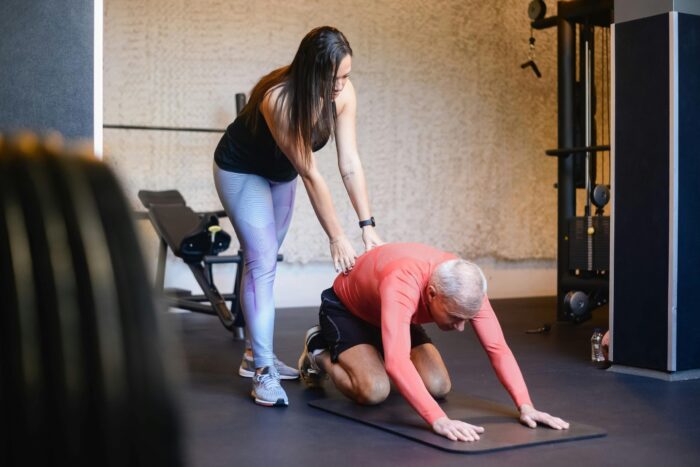How To Keep The Brain Healthy In Old Age
Maintaining a healthy brain in old age is crucial for overall well-being. Here are some key tips:
- Balanced Diet: Consume foods rich in omega-3 fatty acids, antioxidants, and vitamins to support brain health.
- Regular Exercise: Engage in aerobic activities, strength training, and flexibility exercises to boost cognitive function.
- Sufficient Sleep: Establish a consistent sleep routine and create a conducive sleep environment.
- Mental Stimulation: Challenge your brain with puzzles, reading, and learning new skills.
- Social Interaction: Stay connected with friends and family to reduce stress and improve mood.

As we age, maintaining mental health becomes increasingly important. For seniors, a balanced diet, regular exercise, and sufficient sleep are crucial to ensuring a healthy mind. These healthy habits not only improve overall well-being but also enhance cognitive function, reduce the risk of mental health disorders, and promote a higher quality of life. Here are some practical tips for seniors to maintain mental health through these essential lifestyle choices.
Balanced Diet
A nutritious diet is fundamental to mental health. The brain requires a variety of nutrients to function optimally, and a balanced diet provides these essential elements.
Include Omega-3 Fatty Acids: Omega-3 fatty acids, found in fish such as salmon, trout, and sardines, as well as in flaxseeds and walnuts, are crucial for brain health. These healthy fats can help reduce inflammation and improve cognitive function.
Consume Antioxidant-Rich Foods: Foods high in antioxidants, like berries, leafy greens, nuts, and seeds, protect the brain from oxidative stress and inflammation. These foods can also help slow down cognitive decline.
Stay Hydrated: Dehydration can lead to confusion and cognitive impairments. Seniors should aim to drink at least eight glasses of water a day. Herbal teas and water-rich fruits like watermelon and cucumbers are also good options.
Limit Sugar and Processed Foods: High sugar intake and processed foods can lead to inflammation and negatively affect mood and cognitive function. Instead, opt for whole foods like fruits, vegetables, whole grains, and lean proteins.
Eat Regular, Balanced Meals: Skipping meals can lead to blood sugar fluctuations, which can affect mood and energy levels. Regular, balanced meals that include a mix of carbohydrates, proteins, and fats help maintain steady energy and mood.
Regular Exercise
Physical activity is not only beneficial for the body but also for the mind. Regular exercise can reduce the risk of depression, anxiety, and other mental health issues in seniors.
Aerobic Exercise: Activities like walking, swimming, and cycling increase heart rate and improve cardiovascular health, which in turn benefits brain health. Aim for at least 30 minutes of moderate aerobic exercise most days of the week.
Strength Training: Incorporating strength training exercises, such as lifting weights or using resistance bands, can help maintain muscle mass and bone density, which are important for overall health and well-being.
Flexibility and Balance Exercises: Activities like yoga and tai chi improve flexibility and balance, reducing the risk of falls and injuries. These exercises also promote relaxation and reduce stress.
Social Activities: Participating in group exercises or sports can provide social interaction, which is beneficial for mental health. Engaging with others can reduce feelings of loneliness and isolation.
Outdoor Activities: Spending time outdoors, whether it’s gardening, hiking, or simply walking in the park, can boost mood and provide a sense of well-being. Exposure to natural light also helps regulate sleep patterns.
Sufficient Sleep
Adequate sleep is essential for mental health, particularly for seniors. Poor sleep can lead to cognitive decline, mood disturbances, and increased risk of mental health disorders.
Establish a Routine: Going to bed and waking up at the same time every day helps regulate the body’s internal clock. A consistent routine can improve the quality of sleep.
Create a Sleep-Conducive Environment: Ensure the bedroom is dark, quiet, and cool. Consider using earplugs, eye masks, or white noise machines if necessary.
Limit Caffeine and Alcohol: Caffeine and alcohol can interfere with sleep quality. It’s best to avoid these substances in the late afternoon and evening.
Avoid Heavy Meals Before Bed: Eating large meals or heavy, spicy foods before bedtime can cause discomfort and disrupt sleep. Opt for a light snack if you’re hungry in the evening.
Relax Before Bed: Engage in calming activities before bedtime, such as reading, meditating, or taking a warm bath. Avoid screens from phones, tablets, or computers at least an hour before bed, as the blue light can interfere with sleep.
What are 5 ways to improve mental health?
- Stay Active: Regular physical exercise can boost your mood and energy levels while reducing stress and anxiety.
- Eat a Balanced Diet: Consuming nutrient-rich foods supports brain function and overall well-being.
- Get Enough Sleep: Quality sleep is essential for mental clarity, emotional stability, and overall health.
- Stay Socially Connected: Maintain relationships and engage in social activities to combat loneliness and enhance emotional support.
- Practice Mindfulness and Relaxation: Activities like meditation, yoga, and deep breathing can help manage stress and improve mental resilience.
Conclusion
Maintaining mental health through a balanced diet, regular exercise, and sufficient sleep is essential for seniors. These healthy habits not only enhance cognitive function and reduce the risk of mental health disorders but also promote a higher quality of life. By incorporating these tips into daily routines, seniors can enjoy a healthier, happier mind and a more fulfilling life. Remember, it’s never too late to start adopting healthier habits and reaping the benefits for both body and mind.
Related Articles

What is Palliative Care?
Palliative care is a specialized medical care approach focused on providing relief from the symptoms and stress of a serious illness.

Understanding Assisted Living
Assisted living provides older adults with a residential option that combines housing, personal care, and health services.

Introduction to Nursing Homes
Assisted living offers daily support and independence; nursing homes provide 24/7 medical care;

Benefits of Yoga for Seniors
Discover how yoga can enhance flexibility, balance, and mental well-being

Understanding and Choosing a Power of Attorney
What Is The Best Choice For A Power Of Attorney? The best choice for a power of attorney (POA) depends on your specific needs

Medicaid Planning and Asset Protection
How A Medicaid Trust Protects Your Assets A Medicaid Trust, specifically a Medicaid Asset Protection Trust (MAPT), safeguards your assets by transferring ownership

Navigating Probate: What Seniors Need to Know
Here’s What You Need To Know To Get Started Navigating probate involves understanding its steps: filing a petition, notifying beneficiaries and creditors, inventorying and appraising

Home Safety for Seniors
How can I make my house safer for the elderly? To make your house safer for the elderly, focus on eliminating hazards and improving accessibility.





